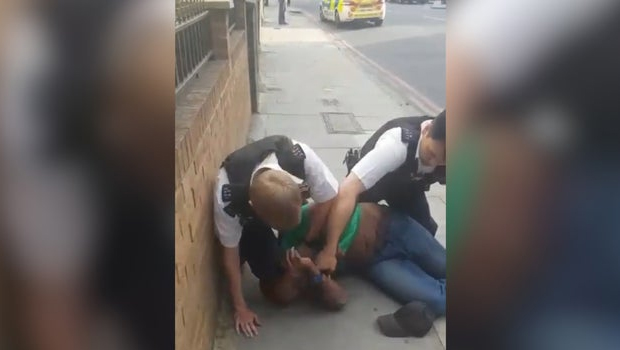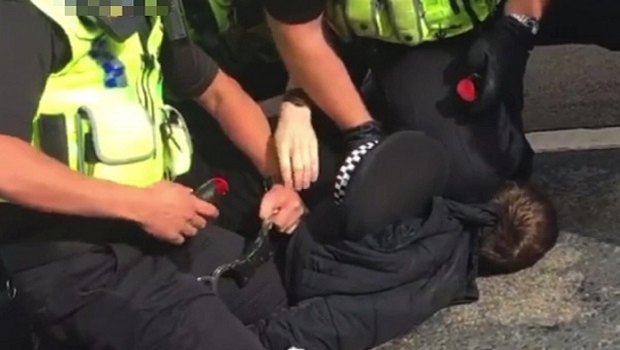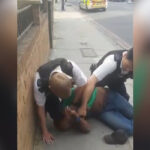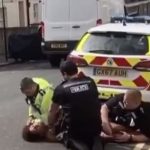More Choke Holds: Minneapolis and UK Policing #5
by TIM HICKS
~~~~~
NYE vindicated concerns and comments vindicated.
The NYE has been running a series of articles on the impact of the death of Mr George Floyd in Minneapolis will have on policing in the UK.
- Minneapolis and North Yorkshire #1 covers the impact of the death of Mr George Floyd in Minneapolis on policing in North Yorkshire.
- Minneapolis and North Yorkshire #2 Covers UK national and North Yorkshire Police policy on chokeholds.
- Minneapolis and North Yorkshire #3 and (which contains a correction to article 3) cover public filming of the police, particularly when filming alleged police misconduct and the incident in York referred to above.
- Minneapolis and UK Policing #4 NYE vindicated which posed the question how often are chokeholds being used by the UK Police.
The articles cover use of chokeholds by the UK police and the impact the events in Minneapolis will have on policing in the UK, in terms of application of use of force and public filming of the police. There are a number of themes running through them, which have been vindicated by subsequent events.
- UK Police policy from the College of Policing effectively prohibits use of chokeholds, unless there is an absolutely realistic prospect of loss of human life. The College of Policing had confirmed to the NYE that:
“Regarding your query about choke holds, the national personal safety training for officers in England and Wales does not contain any choke holds or restraint technique where officers apply pressure to the throat or neck area of a person. Officers are actively discouraged from this, due to the inherent dangers of putting pressure on the neck or throat, particularly during restraint.”
Our own force is North Yorkshire Police, which also very helpfully confirmed that:
“North Yorkshire Police do not train our officers and staff in the use of ‘chokeholds’ as part of Officer Safety Training. It is not an approved technique.”
- It is in the public interest for police officers to be filmed while they are about their duties and particularly if they are committing an act of misconduct. The cases quoted below where filming of police officers has led to investigations by the IOPC vindicate this comment.
- Far from being prohibited, some police officers have been routinely using chokeholds and are still continuing to use them. Some examples which also vindicate this comment:
- Arrest in Brighton by officers of Sussex Police in which it is alleged a neck restraint was used.
This video surfaced of a man being arrested in Brighton by officers of Sussex Police on the 7th of July: Video here which allegedly shows three officers acting in joint enterprise restraining a man, with one officer apparently applying restraint to a man’s neck. Excellent article from the Brighton & Hove News containing a full statement by Sussex Police can be read here.

Police officers restraining a man in Brighton
The Independent Office for Police Conduct (IOPC) has issued this statement. Please note that I have set one sentence in bold type:
“A Sussex Police officer has been advised that he is subject to a misconduct investigation by the Independent Office for Police Conduct (IOPC) and will be asked by investigators to give an account of his use of force.
The investigation follows an incident where a man was restrained following his arrest in Brighton, East Sussex on 7 July. Video footage showing only part of the incident was shared widely on social media.
Our investigation focuses on a use of force prior to this video being taken and not on the restraint of the man on the ground which has been shared on social media.
Body worn video in relation to the whole interaction was seen by the IOPC and Sussex Police Professional Standards Department and it resulted in Sussex Police referring solely the matter relating to the interaction prior to the restraint in the street.
IOPC Regional Director Sarah Green said:
“Having examined a range of evidence including body worn video and witness statements, we have taken the decision that this is now an investigation for misconduct. An investigation does not mean that misconduct proceedings will necessarily follow.”
Our investigation resulted from a conduct referral from Sussex Police following the incident when police were attempting to locate a missing teenager at an address in Montpelier Road, Brighton. They arrested a man, 28, on suspicion of threats to cause criminal damage and, following the arrest, further restraint was required by the officers.”
- Arrest of a man by officers of the Metropolitan Police in which it is alleged that excessive force was used
Two constables from the Metropolitan Police arrested a man in the street in Islington, North London. The man was handcuffed and on the ground with one officer kneeling on him. A crowd gathered and started filming the arrest while pleading with the constable not to apply pressure to the man’s head.
BBC report here. The Deputy Commissioner of the Metropolitan Police Sir Steve House is quoted in the article as saying:
“The video footage that I have seen today and is circulating on social media is extremely disturbing. Some of the techniques used cause me great concern – they are not taught in police training.”
His comments mirror those of the College of Policing and North Yorkshire Police quoted above.

Video (which contains graphic images that some readers may find disturbing) can be seen here.
When I last reported on this case, one officer had been suspended from duty and the other placed on restricted duties. The IOPC has now issued this statement with the latest developments:
“The Independent Office for Police Conduct has launched an independent investigation into the conduct of two Metropolitan Police Service (MPS) officers when making an arrest in Finsbury Park, London on 16 July 2020. This follows a voluntary referral from the MPS.
One officer has been advised that they are subject to a criminal investigation for Common Assault and investigation for Gross Misconduct on use of force; authority, respect and courtesy; discreditable conduct and honesty and integrity. A second officer has been advised they are subject to a misconduct investigation on challenging and reporting improper conduct; authority, respect and courtesy and honesty and integrity.
We have also launched a witness appeal. We would like to hear from anyone who witnessed the arrest on Isledon Road, London N7, on Thursday 16 July 2020 when a black man was stopped and restrained by two MPS officers.
IOPC Regional Director Sal Naseem said:
“We are independently examining whether the use of force and the stop and search on this occasion were appropriate and proportionate in line with approved police policies. We will also investigate whether the officers treated the man differently because of his race.
This incident took place in public and was witnessed by several members of the public. A video of the incident has been widely shared on social media platforms.
We would ask anybody who was in the area that day and saw police activity to get in touch with us.”
Appeal for witnesses
Did you see anything? If so, please call our incident line on 03003035724 or email isledonroad@policeconduct.gov.uk
Source: IOPC
- Use of neck restraint by three officers from West Yorkshire Police
Now it is alleged that an officer of West Yorkshire Police has been filmed kneeling on the neck of a man while policing a football match at Leeds. (See lead illustration) Guardian article giving full details here. Statement from the IOPC below:
“A West Yorkshire Police officer has been advised that he is subject to a criminal investigation by the Independent Office for Police Conduct (IOPC) following the arrest of a 17-year-old made outside Leeds United football ground on 17 July.
The officer will be interviewed by our investigators on suspicion of common assault and also investigated for gross misconduct.
Video footage showing part of the arrest in Elland Road was shared widely on social media and shows the 17-year-old boy being restrained on the ground by officers. In the footage an officer uses their knee, at one point, to restrain the teenager.
We decided to independently investigate the incident after we received a voluntary referral from the force.
IOPC Regional Director Miranda Biddle said:
“We understand why the images that were circulated caused considerable public concern. After the footage was shared on social media, a voluntary referral was made to us in relation to the conduct of the officer.
Having examined a range of evidence including body worn video and initial accounts from the officers involved in the restraint, we have taken the decision that this is now a criminal investigation. A criminal investigation does not mean that criminal charges will necessarily follow.
It is vitally important that the circumstances of this incident are subject to an independent investigation so we can fully understand what happened and impartially determine the facts.
We have already begun to gather evidence but would like to speak to anyone else who was at Leeds United’s ground at the same time for these celebrations and may have witnessed the incident.”
Appeal for witnesses
We would also like to speak to anyone who witnessed the incident which took place at around 5pm as fans gathered to celebrate Leeds United’s promotion to the Premier League.
Witnesses can email Ellandroad@policeconduct.gov.uk or ring 0300 303 5725.
How often are the UK police using illegal choke holds?
Following the death of Mr Floyd, both the College of Policing and Chief Constable Winward of North Yorkshire Police confirmed that the technique that caused the death of Mr Floyd could not be used in the UK. I found this to be reassuring and reported positively to this effect in the NYE articles on this subject.
So I have been shocked that despite the case of Mr Floyd and public concern over use of this technique, police officers appear to be using it routinely across multiple forces.
As one of our readers wrote to me:
“I find it difficult to believe that so many separate but essentially similar incidents across geographically diverse Police forces is coincidental. Despite the College of Policing position set out in your article it does perhaps suggest a covert training agenda and the militarisation of the Police Service.”
I am also shocked that in the three incidents above, not one of the five other officers present (two in Brighton, one in Islington and two in Leeds) restrained their colleague from applying a knee to a prisoner’s neck or head.
Inconsistency in the IOPC response to use of neck restraints
The College of Policing statement and Sir Steven House’s comments above support the view I expressed in the NYE articles that following the death of Mr Floyd and given the above guidance, it would be impossible for a police officer in the UK to justify using a choke hold, unless it was clear that here was a very real overt threat to life.
On the three recent occasions film has emerged of officers choke holds are alleged to have been used in the UK, the officers were immediately referred to the IOPC. At first sight, this would seem to indicate that use of this technique is now unacceptable to both the police service and the public.
However:
- Contrary to what was first thought, the IOPC investigation in Brighton is unrelated to the use of a neck restraint on the man on the ground. The IPCC investigation focuses on a use of force prior to the video being taken and not on the restraint of the man on the ground. Indicating that the officer’s conduct in applying it was acceptable. Conversely, in the Leeds and London incidents, police officers are under investigation for applying a neck restraint, indicating that it isn’t.
- Both of the London officers were acting in joint enterprise to use excessive force to arrest the prisoner by use of a neck restraint. I do not therefore understand why criminal charges may be preferred against one of them, not both of them. In the Minneapolis case, the three other officers present were all charged with aiding and abetting the murder of Mr Floyd by the officer that applied the neck restraint.
- All the officers in London and one officer from Leeds have been placed under investigation for applying a neck restraint. None of the Sussex officers are under investigation over the use of a neck restraint.
- Of the three officers that applied a neck restraint, two are under investigation and one isn’t.
- Of the five officers who stood by and allowed one of their colleagues to apply a neck restraint, only one in London has been served with misconduct papers for (not) challenging and reporting improper conduct; authority, respect and courtesy and honesty and integrity. Paradoxically, the two officers in Brighton and the two in Leeds are not being investigated for not restraining their colleague from applying a neck restraint. Although their conduct appears to me to be exactly the same as the officer in London.
I have concluded that the police have been commonly applying choke holds on an everyday basis and have no concern that this act of misconduct will lead to any consequences for them. Hence the reason they have been applied in defiance of the College of Policing standards. In short, they have a culture of impunity.
If this is so, then it is in the public interest that those police officers that indulge in this practice -and those that acquiesce to it- are prosecuted. To deter other officers from using excessive force, or from failing to challenge and report improper conduct.
That having been said, this has to be done consistently across all forces.
The current contradictory response by four police forces, the College of Policing and the IOPC sends dangerous mixed messages. At present it appears that it is acceptable for police officers in Sussex to apply neck restraints, but not for officers of the Metropolitan, North Yorkshire or West Yorkshire forces. You cannot have one (higher) standard of discipline for the Metropolitan Police Service and a lower one for the County Forces.
I put these concerns to the IOPC and an IOPC Spokesperson confirmed:
“Every investigation has its own unique set of facts and our decisions are made on the evidence available to us at the time – the majority of which is not in the public domain.”
Although this is true, it should be said that I certainly concede I have not had access to all of the evidence that the IOPC has considered. Nevertheless, in my opinion this comment does not address the issue of why Constables from the Metropolitan Police are now facing the possibility of proceedings, whilst officers of Sussex Police, who appear to me to have behaved in the same way, are not. Or, put another way, why is the IOPC failing to hold all police officers to the same standard, in accordance with the national guidance from the College of Policing?
I will let our readers draw their own conclusions.
The NYE will continue to follow this story.


![Minneapolis and North Yorkshire [REDUX]](http://nyenquirer.uk/wp-content/uploads/2020/07/ARREST-150x150.jpg)























Comments are closed.